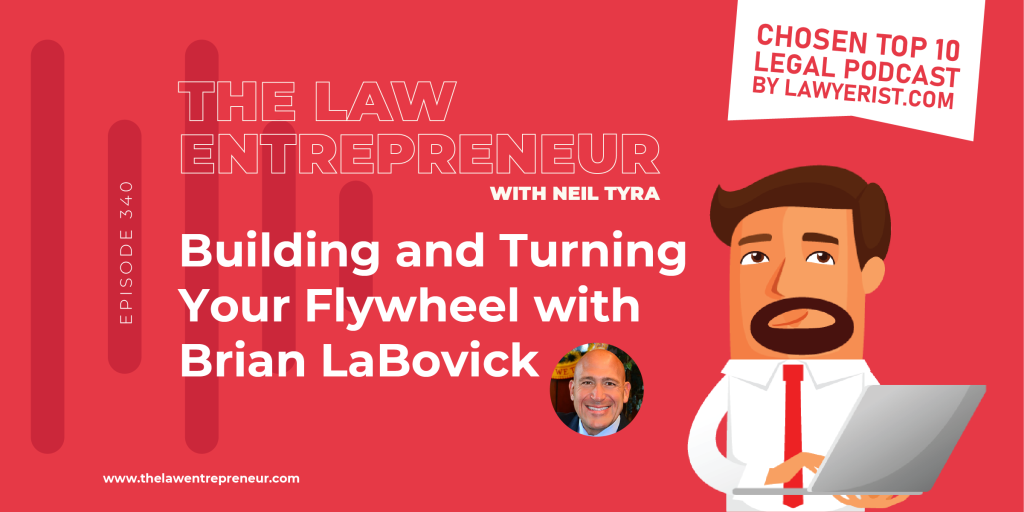Finding success is something that crosses any law firm owner’s mind every single day from the moment they decide to start. Whether it’s in the form of more clients, more profit, or a bigger name in the field, there’s no doubt that climbing to the top is a goal that’s paramount—and you’re probably focusing on it every day.
Now, to be honest about it, building a successful law firm boils down to dozens of different factors that can either be controlled, made, or awaited. And if you ask the industry’s most dominant names about what they did to be where they are today, they’d most likely give you different answers…
But, there’s one key ingredient to law firm success that all of them can agree is more important than ever: marketing.
For Attorney Brian LaBovick, managing shareholder of the LaBovick Law Group, this is exactly what helped his humble, single-person practice become one of the biggest firms in South Florida.
In the span of 35 years, Brian has experienced it all: a fulfilling start as a government prosecutor, success as a solo litigator in the PI field—and today, a key role in aiding hundreds of personal injury, social security disability, workers’ compensation, and medical collections clients in their cases. And while there are many tools that he used to become as successful as he is today, he attributes most of his progress to thinking outside the box when it comes to marketing.
Here’s what he has to say about his approach to growing the LaBovick Law Group:
“Pretty much any way you can market a firm, we market our firm. We do a lot of marketing in our area and our DMA. For anybody who’s young on the call, the key to marketing in my opinion to start to drive in market share is the Internet and is doing direct call advertising in PPC and LSAs and setting up your business using that digital market avenue.”
This episode of The Law Entrepreneur is jam-packed with invaluable insight and advice from Brian LaBovick and his decades of experience in litigation, client collaboration, and law firm ownership. Our discussion also touches on the importance of having a cutthroat hiring process, why it pays to give back in any way you can, and the crucial practice of choosing who you work with.
Here are some of our other favorite takeaways from this episode:
1. Although it can be fulfilling to have a well-paying job in a law firm, nothing maximizes your potential as a practitioner better than starting a firm. Especially in times like these where cases are everywhere and tools to start on your own are freely available, there are fewer excuses to build a practice that will help you work with more clients and make a bigger difference.
In talking about his realization of needing to start his now-successful law firm, Brian shares:
“[Being a sole litigator] was a great job. It was awesome. I had an unlimited bank account and I had a guy that was afraid to go to court and so I was the sole guy that got to do whatever I wanted. I love that job but eventually, it dawned on me that I could do much better on my own, and I started off on my own.“
Once he started his practice, Brian was able to better understand his purpose as a lawyer and utilize the skills and lessons he learned years prior much more than he ever expected.
2. Building your client base all boils down to taking on the most common types of cases—and nowadays, that happens to be divorce cases. And as more people get married, it becomes even clearer that there won’t be any shortage of legal separations to work on any time soon.
Brian talks about how he got his start on going solo in the legal world, saying:
“I started off as a door lawyer they say, whatever walks through the door. The thing that walks through the door is divorce. I don’t know if anybody’s ever started on their own, but if you want to start on your own and you want to do something that walks through the door on any type of an ad, you can just do divorce because there’s a lot of it out there. It’s a blue ocean field, no matter how many people are in it.”
While it sounds brutally honest, divorce rates are on the rise and there are more opportunities for aspiring private practitioners and law firm owners to step in and build their portfolios and clientele.
3. If you really want to bring in more clients and expand your reach, don’t be afraid to reach out and promote yourself. For Brian, he believes that this is one of the approaches that helped him put his practice on the map and in the public consciousness, saying:
“The other way to spend money is direct referral marketing. [You can do this] by going out and talking to other lawyers and saying, “I need business.’”
So, if you want to boost your marketing efforts and help your budding law firm hit the ground running with more cases coming through the door, don’t be afraid to ask a friend, family member, or fellow lawyer for referrals.
4. Want to take your law firm’s potential for growth to new heights? Start getting involved in your surrounding communities more. In fact, Brian stands by this approach through and through because it works as a platform that will let people you’re out to help them while giving you the exposure you need to better tailor your work and services to the needs of clients of all kinds.
Here’s a story Brian shared with us about his friend who started his law firm out of his car and went on to net $20 million in revenue:
“He started with this concept of getting involved in the community, getting his posts out there, letting people on social know who he was and what he did, having a very clear identity and theme to who he wanted to be and developing his audience with no money. It started with no money and as he built money, he built his flywheel. He continued to push money in. He didn’t take the money.”
Even if you don’t have the budget to spend thousands or millions of dollars every year on marketing, getting involved in the community is a free tool that you can use to keep your firm’s flywheel going—and going fast in the long run.
5. Having a successful law firm means making big decisions to preserve your practice’s culture—even if means firing people that don’t fit. Unfortunately, many firm owners learn this reality too late and end up harming their practices because they choose to adjust to new hires that don’t mesh well with their work cultures.
Here’s why Brian believes it’s so important:
“As soon as you’re big enough to start feeling a person isn’t a cultural fit, the first thing you need to do is you need to set clear cultural boundaries and behaviors that are important to your firm. That to me is the primary step of creating any business. Once you do that, you need to stick with it and if you allow someone in your group who [bucks] your culture, and who isn’t a good team player, then you need to kick them out.”
If you want to protect your law firm’s brand and ensure that it puts out a high standard of work that nourishes its reputation, then it’s best to take a stand and weed out team members that aren’t cultural fits!
_____
If you loved our talk with Attorney Brian LaBovick, you can catch the latest episodes of The Law Entrepreneur on our website. Follow us on Twitter for the latest updates.



